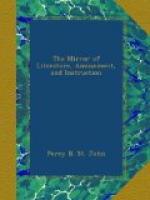“I do not think I ever saw Ellen’s wheel
without flax before, Shane?” “Bad cess
to the wheel;—I got it this morning about
that too—I
depinded on John Williams
to bring the flax from O’Flaharty’s this
day week, and he forgot it; and she says I ought to
have brought it myself, and I close to the spot:
but where’s the good? says I, sure he’ll
bring it next time.” “I suppose,
Shane, you will soon move into the new cottage, at
Clurn Hill. I passed it to-day, and it looked
so cheerful; and when you get there, you must take
Ellen’s advice, and
depend solely on
yourself.” “Och Ma’am, dear,
don’t mintion it—sure it’s
that makes me so down in the mouth, this very minit.
Sure I saw that born blackguard, Jack Waddy, and he
comes in here, quite innocent like”—“Shane,
you’ve an eye to ’Squire’s new lodge,”
says he. “Maybe I have,” says I.
“I am y’er man,” says he. “How
so?” says I. “Sure I’m as good
as married to my lady’s maid,” said he;
“and I’ll spake to the ’Squire for
you, my own self.” “The blessing be
about you,” says I, quite grateful,—and
we took a strong cup on the strength of it; and
depinding
on him, I thought all safe,—“and what
d’ye think, my lady? Why, himself stalks
into the place—talked the ’Squire
over, to be sure—and without so much as
by y’er lave, sates himself and his new wife
on the laase in the house; and I may go whistle.”
“It was a great pity, Shane, that you didn’t
go yourself to Mr. Clurn.” “That’s
a true word for ye, Ma’am, dear; but it’s
hard if a poor man can’t have a frind to DEPIND
on.”—
Sketches of Irish Character,
by Mrs. S.C. Hall.
* * * *
*
THE GATHERER.
“A snapper-up of unconsidered trifles.”
SHAKSPEARE
* * * *
*
POTATOES.
One is almost induced to imagine that certain orders
of London conceive that “takers,”
as they commonly call them in their uncooked state,
is a generical term; and that they only become entitled
to the prefix of “pot,” after they
have been boiled.
* * * *
*
DINING LATE.
A wag, on being told it was the fashion to dine later
and later every day, said, “he supposed it would
end at last in not dining till to-morrow!”
* * * *
*
MOORE’S LIFE OF BYRON.
Moore has printed between three and four hundred pages
of his Life of Lord Byron, which is interspersed with
original letters and poems, of singular merit—after
the manner of Mason’s Life of Gray, and Hayley’s
Life of Cowper. Nearly the whole of the manuscript
is in town, and the work, consisting of a thick 4to.
volume, will be published during the season.—Court
Journal, No. 1.




